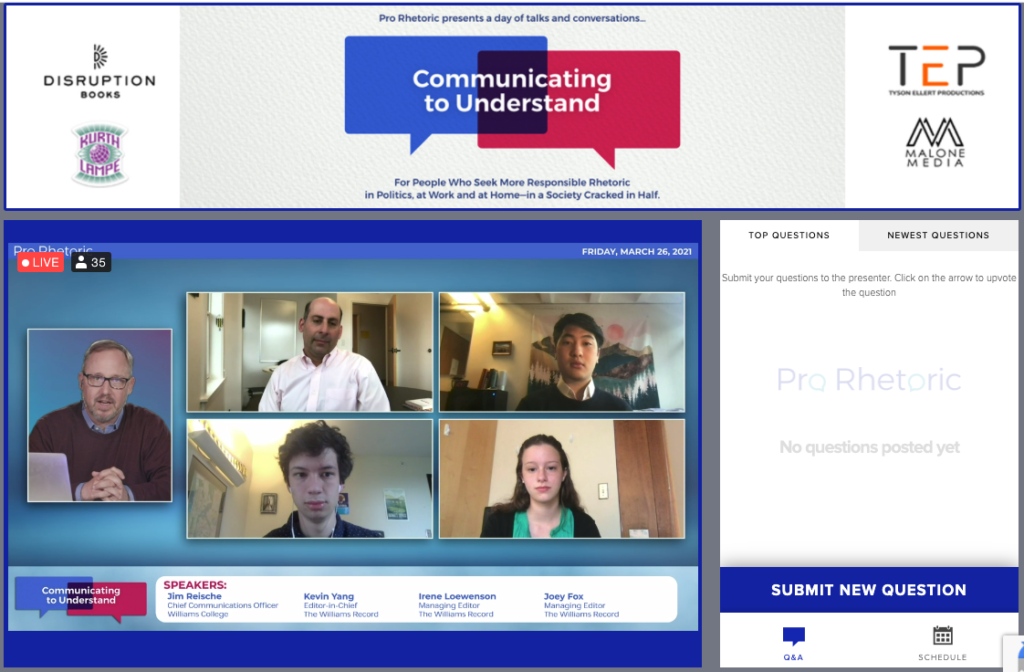Our Effort to Understand
March 29, 2021
What happened when 100 communicators gathered online for “Communicating to Understand”? You had to be there to know how it felt—but here’s some of what was said.
Your first worry, when you organize a conference on a subject that seems as basic as the title of “Communicating to Understand” suggests, is that no one will come, everyone believing they already know most of what the conference has to teach—and thinking that the event must be for other, less evolved people than they.
Your second worry, once more than 100 sensitive, smart, conscientious souls from around the world and every corner of the communication business have registered for the conference, is that everyone actually does pretty much know most of what the conference has to teach, and they will find the conversations disappointing.
So I was relieved afterwards, after every single session received thoughtful engagement and the whole conference left people stimulated. “I’ve been thinking and mulling, stewing, and even steaming a bit ever since,” wrote veteran speechwriter Lucinda Trew, adding, “all high marks of success, I believe!” speechwriter Neil Hrab said he thought the conference captured “how we’re going to be talking and thinking about our work for some time to come.”
Meanwhile, I was gratified to find that I myself, despite the distraction of playing anchor and chief worrier both, felt personally engaged in these conversations—not just the words, but the mood. I came away feeling affirmed that people of many stripes can get together to talk about difficult topics, and talk about them constructively without resorting to the banal.
Of course, you had to be there, and the genre of immortal writing on conferences is thin indeed. But here’s some of what we discussed that might stay with me.
How to know you’re using your communication skills to do good in the world: “Have a word with yourself,” keynoter Simon Lancaster advised. Fast-forward your life to the end and use your moral imagination to look back on the nature of the work that you are doing today and ask yourself: Are you proud?
Enemies are people, too. Lancaster chronicled the ancient and up-to-the-minute history of leaders using metaphors that dismiss and subjugate some groups of people as sub-human—the deadliest rhetorical trick in the book. I said many polite nowadays know better than to call other people “animals”—but they nevertheless imply others are sub-human or not human by self-righteously declaring, “I will never understand” how another human being could think or vote in a certain way. Stop that.
Life is hard for responsible communicators of all ages and stations in life. Williams College Chief Communication Officer Jim Reische led a conversation with three undergraduates who edit the student newspaper at the liberal arts college. In the course of the conversation, the student journalists and the audience both seemed to realize that the pressures on them—to write stories that are true and fair and acceptable to a wide variety of campus constituents ranging from the university president to their own friends—left them sharing much in common with Reische, and middle-aged communicators like him. Responsible communicators are all in this together.

When you get it right, responsible communication is its own reward. One of the Williams Record staffers, junior Joey Fox, was asked what he learned this year. He said he was astonished, even when writing a boring, informational article about COVID precautions, at how good it felt to know that there was a chance the article could be “useful” to his fellow students, by making them better informed, and thus safer.
How are we going to get Congress to do better? How are we going to get cable news to be more responsible? By being more reasonable, informed, grown-up voters who don’t give in to their temptation to be polarized for profit. We talked about that a lot.
How do you make sure you’re not being myopic in your view? Seek and cultivate relationships with bright, admirable people who hold different views than you do—even in your own household, as former George W. Bush speechwriter Noam Neusner suggested on a panel of conservative communicators, noting that that very morning he’d been on a three-mile run talking through some gnarly issues with one of his beloved, “very liberal” teenage daughters. Such experiences, Neusner said, help him do what a practicing communicator must, which is to distinguish between the specifics of one’s political ideas and the life of one’s soul.
It’s absolutely impossible to listen well while simultaneously trying to win the argument. Dialogue Project founder Bob Feldman said one of the key insights that he ran across in the course of his study was the quietly revolutionary notion of “taking winning off the table” when having a conversations. Aside from the fact that most arguments end in a draw anyway, Feldman and subsequent speakers and participants said that listening well requires total concentration, which is impossible when you are communicating to persuade, to convince, to win. “We have to listen and really hear, what is in the lines and between the lines and what remains unsaid, but which is still communicated,” PSA member and conference participant Eliot Claus recapped afterward.
Communication is hard. Many of the issues we face are hard—immigration, environment, race. And being a responsible citizen of the United States of America is hard. Recognizing that—and not dismissing your idea of a solution as “just common sense,” and slugging others with slogans (“stop the hate!”)—sets sane expectations. “We have to make an effort in the United States,” Robert Kennedy said in the phrase that led to the title of my book, “to understand.”
And not just a one-day effort, but a daily, monthly, yearly effort. A forever effort. As Eliot Claus wrote to me, “Understanding takes time, thought and deep conversations with ourselves and others. If we want to have a chance at solving any problems or issues in life, this is probably the best place to begin.”
As fruitfully and as constructively as it began last week, may this communication conversation continue.




Congratulations David on a great initiative. Sorry I missed it. Hoping you’ll do something similar during the worldwide.